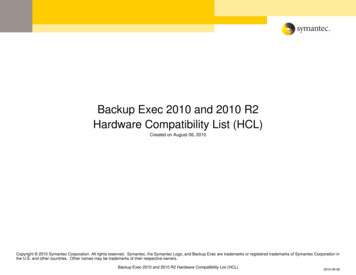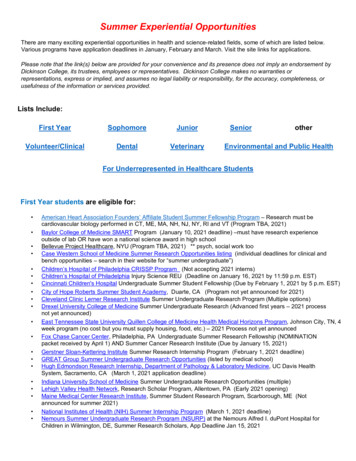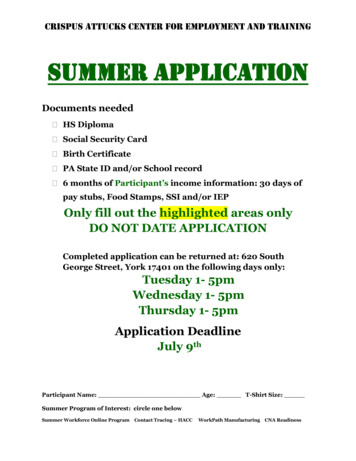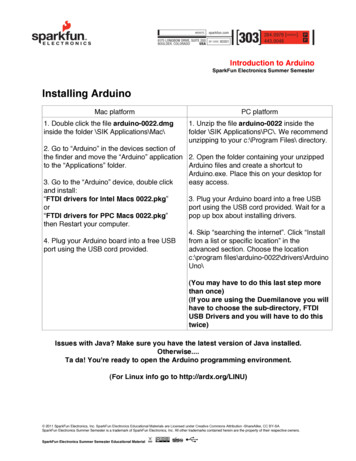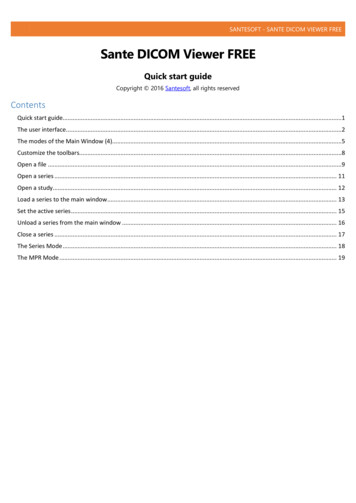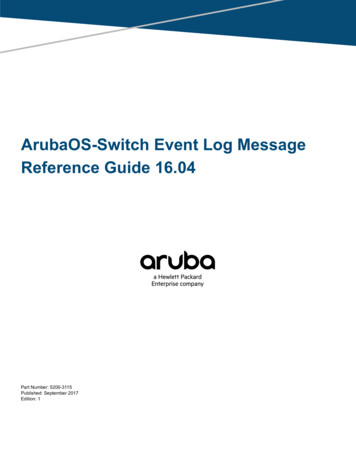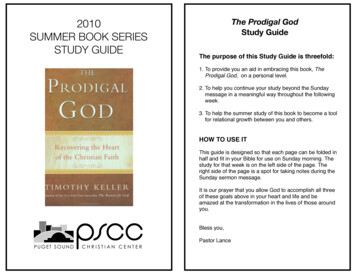
Transcription
2010SUMMER BOOK SERIESSTUDY GUIDEThe Prodigal GodStudy GuideThe purpose of this Study Guide is threefold:1. To provide you an aid in embracing this book, TheProdigal God, on a personal level.2. To help you continue your study beyond the Sundaymessage in a meaningful way throughout the followingweek.3. To help the summer study of this book to become a toolfor relational growth between you and others.HOW TO USE ITThis guide is designed so that each page can be folded inhalf and fit in your Bible for use on Sunday morning. Thestudy for that week is on the left side of the page. Theright side of the page is a spot for taking notes during theSunday sermon message.It is our prayer that you allow God to accomplish all threeof these goals above in your heart and life and beamazed at the transformation in the lives of those aroundyou.Bless you,Pastor Lance
The Prodigal GodChapter 1: The People Around Jesus1. There were two kinds/groups of people around Jesus whenthis parable was told - describe them.1)2)2. Rather than sentimentalizing this parable, what did Jesus wantto show us, religious people?3. Whose side is Jesus on?4. When the early Christians were asked, “Where is yourtemple? Where do your priests labor? Where do you offersacrifices?” How did they respond?How is that different today?5. In each encounter, when Jesus meets an (sexual, racial, orpolitical) outcast and a religious person (Luke 7, John 3-4,Luke 19), who is it that connects to Jesus?6. If our preaching and practice is not having the same effect onpeople that Jesus had, then.The Prodigal GodSermon Notes: Chapter 1Sunday, July 18, 2010
The Prodigal GodChapter 2: The Two Lost Sons1. What is startling about the father’s response to the youngerson’s words, “Give me my share!”?2. What was the younger son’s (return) plan?How does his father respond to that plan?Describe each of them.a) the best robeb) a ringc) shoesd) the celebration3. What is the older brother’s response to the return of hisyounger brother?How does the father respond to his elder son?4. Why doesn’t Jesus finish the story and tell us what elsehappened?The Prodigal GodSermon Notes: Chapter 2Sunday, July 25, 2010
The Prodigal GodChapter 3: Redefining Sin1. Explain the two ways to find happiness.1) Moral conformity:2) Self-discovery:2. Does everyone fall into one or the other of thesehappiness-finding categories? Explain.3. Why doesn’t the elder (good) brother go into his Father’sfeast/celebration?4. What does each brother want?5. How were both brother’s hearts the same?6. What is Jesus’ deeper concept of sin?7. What is Jesus’ message (gospel)?The Prodigal GodSermon Notes: Chapter 3Sunday, August 1, 2010
The Prodigal GodChapter 4: Redefining Lostness1. What is the younger brother’s “lostness”?2. What are the features of the older brother’s lostness?Explain each.a) angerb) self-righteousnessc) judgment & inability to forgived) slavishnesse) emptinessf) lack of assurance of the father’s love3. How do these same features of lostness listed above usuallyaffect your prayer life?4. Why is it important to know that Jesus exposes the elderbrother’s lostness as being as wrong as the youngerbrother’s?The Prodigal GodSermon Notes: Chapter 4Sunday, August 8, 2010
The Prodigal GodChapter 5: The True Elder Brother1. What do we need first in order to escape our particular brandof lostness?2. What is meant by “ our repentance must go deeper than justregret for individual sins.”3. When the “Pharisees” sin they feel terrible and repent. Why isthis not enough? What is the “real” problem?4. What is the one striking difference between the two stories oflostness (sheep & coin) in Luke 15 and the third one (thelost sons)?5. Who should have gone out to search for the younger brother?Why?6. Mercy and forgiveness are free (they can not be earned), butwhat is the true cost?The Prodigal GodSermon Notes: Chapter 5Sunday, August 15, 2010
The Prodigal GodChapter 6: Redefining Hope1. How would you describe your longing for home?2. We desperately try to re-create the home we lost when we leftGod’s presence, but what is the outcome?3. What are the difficulties with trying to return home?Describe them.a) fear of rejection:b) our brokenness:4. How would you initially describe the home of promise - theone available now and the one forever?The Prodigal GodSermon Notes: Chapter 6Sunday, August 22, 2010
The Prodigal GodChapter 7: The Feast of the Father1. The father’s feast is to be experienced. “Taste and see that theLord is good.” How have you tasted of His good feast?2. The meal is a very physical (material) experience. God calledHis (physical/material) creation “good”. How does theFather want you to participate in the renewal of this world?3. His meal provides the “fuel” for individual growth anddevelopment. How are you transforming?4. What is so scary about unmerited, free grace?5. Martin Luther said, “We are saved by faith alone, but not byfaith that remains alone.” What does that mean to you?6. The Father’s feast is meant to be shared communally. Howare you finding this applicable in your life?The Prodigal GodSermon Notes: Chapter 7Sunday, August 29, 2010
The Prodigal God Study Guide The purpose of this Study Guide is threefold: 1. To provide you an aid in embracing this book, The Prodigal God, on a personal level. 2. To help you continue your study beyond the Sunday message in a meaningful way throughout the following week. 3. To help the summer study of this book to become a toolFile Size: 571KB

